Solar eclipse of April 1, 2098
| Solar eclipse of April 1, 2098 | |
|---|---|
| Type of eclipse | |
| Nature | Partial |
| Gamma | −1.1005 |
| Magnitude | 0.7984 |
| Maximum eclipse | |
| Coordinates | 61°00′S 38°06′W / 61°S 38.1°W |
| Times (UTC) | |
| Greatest eclipse | 20:02:31 |
| References | |
| Saros | 121 (65 of 71) |
| Catalog # (SE5000) | 9728 |
A partial solar eclipse will occur at the Moon's ascending node of orbit on Tuesday, April 1, 2098,[1] with a magnitude of 0.7984. A solar eclipse occurs when the Moon passes between Earth and the Sun, thereby totally or partly obscuring the image of the Sun for a viewer on Earth. A partial solar eclipse occurs in the polar regions of the Earth when the center of the Moon's shadow misses the Earth.
The partial solar eclipse will be visible for parts of Antarctica and southern and central South America.
Eclipse details
[edit]Shown below are two tables displaying details about this particular solar eclipse. The first table outlines times at which the moon's penumbra or umbra attains the specific parameter, and the second table describes various other parameters pertaining to this eclipse.[2]
| Event | Time (UTC) |
|---|---|
| First Penumbral External Contact | 2098 April 01 at 17:58:11.5 UTC |
| Equatorial Conjunction | 2098 April 01 at 18:54:45.1 UTC |
| Ecliptic Conjunction | 2098 April 01 at 19:50:13.0 UTC |
| Greatest Eclipse | 2098 April 01 at 20:02:30.8 UTC |
| Last Penumbral External Contact | 2098 April 01 at 22:07:11.4 UTC |
| Parameter | Value |
|---|---|
| Eclipse Magnitude | 0.79844 |
| Eclipse Obscuration | 0.73374 |
| Gamma | −1.10049 |
| Sun Right Ascension | 00h46m32.1s |
| Sun Declination | +04°59'38.4" |
| Sun Semi-Diameter | 16'00.4" |
| Sun Equatorial Horizontal Parallax | 08.8" |
| Moon Right Ascension | 00h48m30.7s |
| Moon Declination | +04°05'18.4" |
| Moon Semi-Diameter | 15'21.2" |
| Moon Equatorial Horizontal Parallax | 0°56'20.9" |
| ΔT | 121.9 s |
Eclipse season
[edit]This eclipse is part of an eclipse season, a period, roughly every six months, when eclipses occur. Only two (or occasionally three) eclipse seasons occur each year, and each season lasts about 35 days and repeats just short of six months (173 days) later; thus two full eclipse seasons always occur each year. Either two or three eclipses happen each eclipse season. In the sequence below, each eclipse is separated by a fortnight.
| April 1 Ascending node (new moon) |
April 15 Descending node (full moon) |
|---|---|
 |

|
| Partial solar eclipse Solar Saros 121 |
Total lunar eclipse Lunar Saros 133 |
Related eclipses
[edit]Eclipses in 2098
[edit]- A partial solar eclipse on April 1.
- A total lunar eclipse on April 15.
- A partial solar eclipse on September 25.
- A total lunar eclipse on October 10.
- A partial solar eclipse on October 24.
Metonic
[edit]- Preceded by: Solar eclipse of June 13, 2094
- Followed by: Solar eclipse of January 19, 2102
Tzolkinex
[edit]- Preceded by: Solar eclipse of February 18, 2091
- Followed by: Solar eclipse of May 14, 2105
Half-Saros
[edit]- Preceded by: Lunar eclipse of March 26, 2089
- Followed by: Lunar eclipse of April 7, 2107
Tritos
[edit]- Preceded by: Solar eclipse of May 2, 2087
- Followed by: Solar eclipse of March 1, 2109
Solar Saros 121
[edit]- Preceded by: Solar eclipse of March 21, 2080
- Followed by: Solar eclipse of April 13, 2116
Inex
[edit]- Preceded by: Solar eclipse of April 21, 2069
- Followed by: Solar eclipse of March 13, 2127
Triad
[edit]- Preceded by: Solar eclipse of June 1, 2011
- Followed by: Solar eclipse of January 31, 2185
Solar eclipses of 2098–2101
[edit]This eclipse is a member of a semester series. An eclipse in a semester series of solar eclipses repeats approximately every 177 days and 4 hours (a semester) at alternating nodes of the Moon's orbit.[3]
The partial solar eclipse on October 24, 2098 occurs in the previous lunar year eclipse set.
| Solar eclipse series sets from 2098 to 2101 | ||||||
|---|---|---|---|---|---|---|
| Ascending node | Descending node | |||||
| Saros | Map | Gamma | Saros | Map | Gamma | |
| 121 | April 1, 2098 Partial |
−1.1005 | 126 | September 25, 2098 Partial |
1.14 | |
| 131 | March 21, 2099 Annular |
−0.4016 | 136 | September 14, 2099 Total |
0.3942 | |
| 141 | March 10, 2100 Annular |
0.3077 | 146 | September 4, 2100 Total |
−0.3384 | |
| 151 | February 28, 2101 Annular |
0.9964 | 156 | August 24, 2101 Partial |
−1.1392 | |
Saros 121
[edit]This eclipse is a part of Saros series 121, repeating every 18 years, 11 days, and containing 71 events. The series started with a partial solar eclipse on April 25, 944 AD. It contains total eclipses from July 10, 1070 through October 9, 1809; hybrid eclipses on October 20, 1827 and October 30, 1845; and annular eclipses from November 11, 1863 through February 28, 2044. The series ends at member 71 as a partial eclipse on June 7, 2206. Its eclipses are tabulated in three columns; every third eclipse in the same column is one exeligmos apart, so they all cast shadows over approximately the same parts of the Earth.
The longest duration of totality was produced by member 39 at 6 minutes, 20 seconds on June 21, 1629, and the longest duration of annularity will be produced by member 62 at 2 minutes, 27 seconds on February 28, 2044. All eclipses in this series occur at the Moon’s ascending node of orbit.[4]
| Series members 49–70 occur between 1801 and 2200: | ||
|---|---|---|
| 49 | 50 | 51 |
 October 9, 1809 |
 October 20, 1827 |
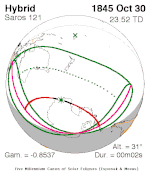 October 30, 1845 |
| 52 | 53 | 54 |
 November 11, 1863 |
 November 21, 1881 |
 December 3, 1899 |
| 55 | 56 | 57 |
 December 14, 1917 |
 December 25, 1935 |
 January 5, 1954 |
| 58 | 59 | 60 |
 January 16, 1972 |
 January 26, 1990 |
 February 7, 2008 |
| 61 | 62 | 63 |
 February 17, 2026 |
 February 28, 2044 |
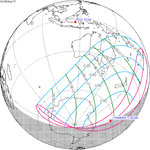 March 11, 2062 |
| 64 | 65 | 66 |
 March 21, 2080 |
 April 1, 2098 |
 April 13, 2116 |
| 67 | 68 | 69 |
 April 24, 2134 |
 May 4, 2152 |
 May 16, 2170 |
| 70 | ||
 May 26, 2188 | ||
Metonic series
[edit]The metonic series repeats eclipses every 19 years (6939.69 days), lasting about 5 cycles. Eclipses occur in nearly the same calendar date. In addition, the octon subseries repeats 1/5 of that or every 3.8 years (1387.94 days). All eclipses in this table occur at the Moon's ascending node.
| 23 eclipse events between June 13, 2094 and November 7, 2181 | ||||
|---|---|---|---|---|
| June 13–14 | April 1–2 | January 19–20 | November 6–7 | August 25–26 |
| 119 | 121 | 123 | 125 | 127 |
 June 13, 2094 |
 April 1, 2098 |
 January 19, 2102 |
 November 6, 2105 |
 August 26, 2109 |
| 129 | 131 | 133 | 135 | 137 |
 June 13, 2113 |
 April 2, 2117 |
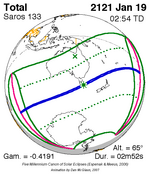 January 19, 2121 |
 November 6, 2124 |
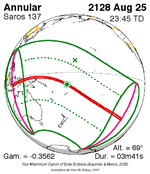 August 25, 2128 |
| 139 | 141 | 143 | 145 | 147 |
 June 13, 2132 |
 April 1, 2136 |
 January 20, 2140 |
 November 7, 2143 |
 August 26, 2147 |
| 149 | 151 | 153 | 155 | 157 |
 June 14, 2151 |
 April 2, 2155 |
 January 19, 2159 |
 November 7, 2162 |
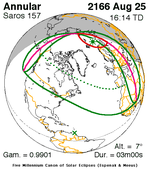 August 25, 2166 |
| 159 | 161 | 163 | 165 | |
 June 14, 2170 |
 April 1, 2174 |
 November 7, 2181 | ||
Tritos series
[edit]This eclipse is a part of a tritos cycle, repeating at alternating nodes every 135 synodic months (≈ 3986.63 days, or 11 years minus 1 month). Their appearance and longitude are irregular due to a lack of synchronization with the anomalistic month (period of perigee), but groupings of 3 tritos cycles (≈ 33 years minus 3 months) come close (≈ 434.044 anomalistic months), so eclipses are similar in these groupings.
| Series members between 2054 and 2200 | ||||
|---|---|---|---|---|
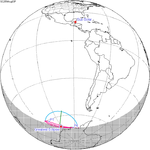 August 3, 2054 (Saros 117) |
 July 3, 2065 (Saros 118) |
 June 1, 2076 (Saros 119) |
 May 2, 2087 (Saros 120) |
 April 1, 2098 (Saros 121) |
 March 1, 2109 (Saros 122) |
 January 30, 2120 (Saros 123) |
 December 30, 2130 (Saros 124) |
 November 28, 2141 (Saros 125) |
 October 28, 2152 (Saros 126) |
 September 28, 2163 (Saros 127) |
 August 27, 2174 (Saros 128) |
 July 26, 2185 (Saros 129) |
 June 26, 2196 (Saros 130) | |
Inex series
[edit]This eclipse is a part of the long period inex cycle, repeating at alternating nodes, every 358 synodic months (≈ 10,571.95 days, or 29 years minus 20 days). Their appearance and longitude are irregular due to a lack of synchronization with the anomalistic month (period of perigee). However, groupings of 3 inex cycles (≈ 87 years minus 2 months) comes close (≈ 1,151.02 anomalistic months), so eclipses are similar in these groupings.
| Series members between 1801 and 2200 | ||
|---|---|---|
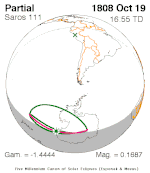 October 19, 1808 (Saros 111) |
||
 August 20, 1895 (Saros 114) |
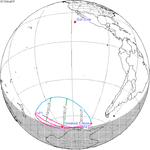 July 31, 1924 (Saros 115) |
 July 11, 1953 (Saros 116) |
 June 21, 1982 (Saros 117) |
 June 1, 2011 (Saros 118) |
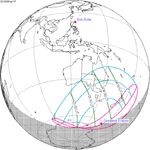 May 11, 2040 (Saros 119) |
 April 21, 2069 (Saros 120) |
 April 1, 2098 (Saros 121) |
 March 13, 2127 (Saros 122) |
 February 21, 2156 (Saros 123) |
 January 31, 2185 (Saros 124) |
|
References
[edit]- ^ "April 1, 2098 Partial Solar Eclipse". timeanddate. Retrieved 25 August 2024.
- ^ "Partial Solar Eclipse of 2098 Apr 01". EclipseWise.com. Retrieved 25 August 2024.
- ^ van Gent, R.H. "Solar- and Lunar-Eclipse Predictions from Antiquity to the Present". A Catalogue of Eclipse Cycles. Utrecht University. Retrieved 6 October 2018.
- ^ "NASA - Catalog of Solar Eclipses of Saros 121". eclipse.gsfc.nasa.gov.
External links
[edit]- Earth visibility chart and eclipse statistics Eclipse Predictions by Fred Espenak, NASA/GSFC


